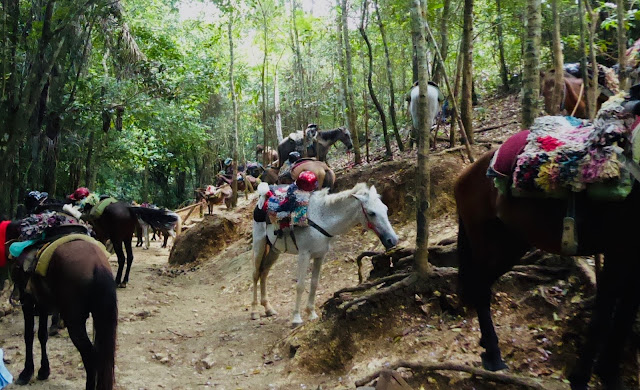 |
| Driving across the Samana peninsula, we found a new graveyard under construction. |
 |
| The bulk of the people of the DR live like this family. |
The other day I could not for the life of me find the noun “pelican.” I was looking right at the bird; I wanted to quickly point out something the bird was doing and I could not find “pelican” in my word bank. A shadow of the word I wanted seemed to be hiding nearby in a fog, but the word itself was….poof, unable to be found.
 |
Small houses, outbuildings line the road across the peninsula |
We have been in Spanish-speaking countries now for a while. The Dominican Republic now and Colombia in March for my stepson’s wedding. I worked hard on improving my Spanish before going to Bogotá for the wedding.
The really surprising thing about misplacing nouns is that—while I'm occasionally unable to find the English words I want, I am finding Spanish words from 45 years ago! Words I probably never needed for use in conversation and don’t need now. Spanish nouns sometimes appear out of nowhere; words I did not know that I had ever learned, right when the situation calls for it.
Yesterday when I heard someone say, “Oh they have rabbits here.” I surprised myself by translating silently, “Conejos” (ro. cone AY hose). “Tienen conejos aquí.” Easy as pie. So, it appears that I inexplicably retained the Spanish noun for “rabbit,” perhaps in trade for the English noun “pelican?” Unbelievable.
I know I’m not the only one who can’t find words when needed. Recently my husband was preparing to climb down inside the lazarette and he was gathering together the tools, etc needed for this foray into the darkness of the hull. At the last moment, he points and says, “Could you hand me my……………footers?” We laughed. Footers! Hah! “Yes, indeed, my husband, here are your shoes.”
Isn’t this just ridiculous? Common ordinary words disappear willy nilly, but yet, there is enough room in my head for unnecessary nouns in a foreign language, words like “conejo” which I’m pretty sure I can get along without quite happily. I mean, it’s not going to be on any menu. Why do I need that noun?
And if I did need that word, I could just describe it.…”Sabes, pequeño mamífero, orejas grandes, le gustan las zanahorias, el lúpulo.” (You know…. small mammal, big ears, likes to eat carrots, hops…” And you could say, “Oh, conejo.” Or "rabbit" if you prefer.
 |
| Atlantic Ocean beach on north side of Samana peninsula. Surrounded by resorts. |
And if I did need that word, I could just describe it.…”Sabes, pequeño mamífero, orejas grandes, le gustan las zanahorias, el lúpulo.” (You know…. small mammal, big ears, likes to eat carrots, hops…” And you could say, “Oh, conejo.” Or "rabbit" if you prefer.
I’m going to miss speaking Spanish when we leave the Dominican Republic to head further north. Don’t get me wrong, I don’t speak well enough to always understand the answer I get when I’ve asked a question. When people speak quickly, I may as well give it up, but sometimes people are willing to speak “más lentamente, por favor.” More slowly, please. And it's great when they use commonly used verbs.
Yesterday I had a lovely little conversation with a guide who accompanied me while the horse, Luzario, carried me to the falls at El Limón, a 30 minute mountain trek. I understood most everything she said. It felt gratifying to be able to converse with this kind, simple woman.
I found all my Spanish words as needed. She asked to be paid her tip (propino) before returning the horse to the handlers because the other workers would otherwise take half of her days’ earnings. She smiled warmly and patted me softly on my leg in the stirrup. “Gracias, mi amiga.”
Well, here is where I’m at with the lost and found words— the next time I can't find an English word, I’ll use the Spanish noun, if I have found it. Maybe it’ll shame the English noun to come out of the shadows. And that darn bird whose name I could not find in English? I have it in Spanish now—it’s “pelícano.” So there.












1 comment:
I've got the same issue so at least you have company.
Deb
Post a Comment